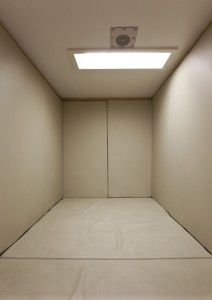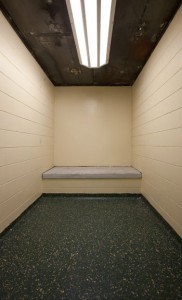
A solitary confinement cell at the Loysville Youth Development Center, Loysville, Pa. Photo by Richard Ross.
The American Civil Liberties Union and Human Rights Watch published a stinging indictment Wednesday against the use of solitary confinement on minors – adding momentum to a lawsuit filed here last month claiming youth were locked in tiny, haunting cells for brushes as minor as speaking out of turn to a guard or disrupting a meal.
Wednesday’s 141-page report, which captured harrowing accounts from youngsters locked in solitary for up to months at a time, if not longer, called for an end to the practice, the exploration of remedial alternatives and changes to state and federal laws that currently allow for the practice.
Solitary -- according to the report’s interviews with prison officials and 125 minors from 19 states, including visits to facilities in Colorado, Florida, Michigan, New York and Pennsylvania -- can cause irreparable harm to a minor’s psychological makeup at the very time their minds are maturing. Just as troubling, according to the report and experts in the field, solitary can re-traumatize juveniles who have grown up with abusive and violent pasts.
“The hardest thing about isolation is that you are trapped in such a small room by yourself,” according to a March interview in the report with a Michigan inmate identified as Paul K. “There is nothing to do so you start talking to yourself and getting lost in your own little world. It is crushing. You get depressed and wonder if it is even worth living. Your thoughts turn over to the more death-oriented side of life … I want[ed] to kill myself.”
The punishment, researchers found, was practiced in juvenile facilities as well as on minors sentenced to adult jails and prisons.
Much of the report echoed the claims made in a federal lawsuit filed by the ACLU-Illinoisagainst the state’s juvenile corrections department last month. At the time the suit was filed in federal court in Chicago in mid-September, the ACLU included a sort-of prescription for remedying the problem in Illinois facilities.
“Our position is solitary confinement is never appropriate for juveniles with the sole exceptions of maybe an hour or so for somebody who may be physically out of control, as part of a behavioral intervention, time-out program,” said ACLU-Illinois Senior Counsel Adam Schwartz. “But anything other than that is just completely inappropriate for children.
ACLU-Illinois filed suit and a companion proposal to remedy the problem in mid-September,

Richard Ross
A solitary cell at the Harrison County Juvenile Detention Center, Biloxi, Miss. Photo by Richard Ross.
Schwartz said. The suit and the proposal focuses on five areas of concern, among them solitary confinement for inmates ages 13 to 20.
The federal judge in the case signed off on a preliminary agreement, but a fairness hearing to actually kick in a period of monitoring and investigating isn’t scheduled until December 6 – “and hopefully that will end solitary confinement in Illinois,” Schwartz said.
“Solitary breaks the spirit and injures the mental health of adults,” he said. “Children, of course, are more vulnerable,” as their minds experience time more slowly, the chemical wiring of their brains is still ongoing and the punishment comes at the very time these minors need the sort of human interaction that will lead to more social and productive experiences.
“When you throw someone in solitary confinement, it re-traumatizes them, it’s a very upsetting experience, and it’s not just the confinement itself,” Schwartz said. “The place is filthy, it is small, it’s dark, it smells, there are bugs. And it’s not just for a violent offense. There’s kids who ate off someone else’s plate, or they were mouthy with a guard or they refused to step out of their cell at the breakfast call in the morning. We think there’s too much use, the conditions are horrible and really, the only solution is to just get rid of solitary confinement in juvenile prisons.”
The national report notes that in New York’s storied Rikers Island, the average stay of juveniles in solitary confinement was 43 days at a facility where nearly half of all adolescents have been diagnosed with some sort of mental illness. Overall in New York during the last fiscal year, which ended in June, almost 15 percent of the state system’s inmates under the age of 18 had spent time in solitary.
In a statement, Ian Kysel, a Aryeh Neier Fellow with Human Rights Watch and the ACLU, and the report’s author, said: “No one believes that locking a teenager in a closet is an effective way to improve either their behavior or their character, much less to protect them long term… Young people have rights and needs that are different from adults; jail and prison practices should reflect those differences and promote their ability to grow and change – we should invest in youth, not banish them.”